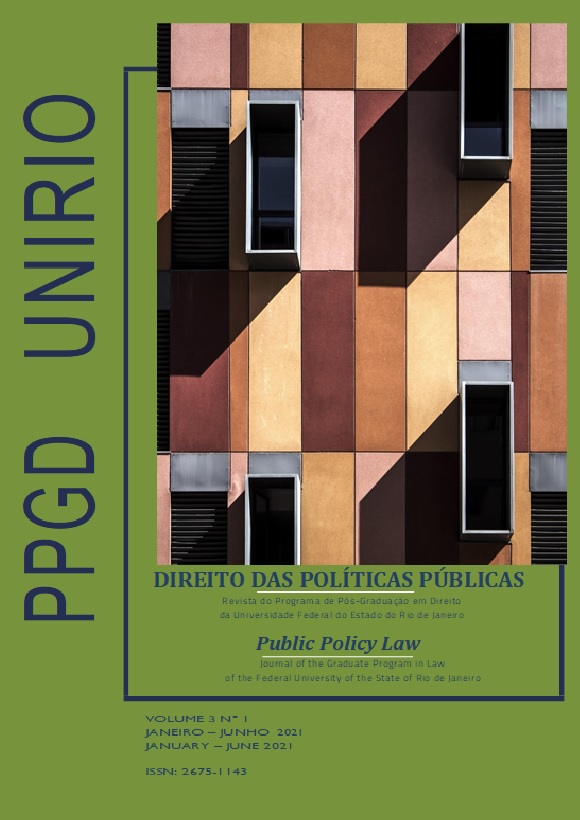MASTER IN LAW
The Master in Law has one area of concentration and two lines of research. The master's students must comply with 8 credits in compulsory subjects, 8 credits between electives (preferably in the scope of the chosen research line), 8 credits in Research Seminars, 4 credits in the Qualification Exam, 4 credits in the Teaching Internship, totaling 32 credits .
Area of Concentration: State, Society and Public Policies
Obligatory disciplines of the two research lines:
Public Policy Analysis
Research Seminar I
Research Seminar II
Research Line I: State, Constitution and Public Policy
Compulsory Subject: Democracy and Constitution
Elective Subjects:
Comparative Political Institutions
Economic Order, Regulation and Public Policy
Control of Public Policies and Public Managers
Financing of Public Policies
Special Topics on Law and Public Policy
Research Line II: Law, Public Policy and Sustainability
Compulsory Subject: Judicialization of Public Policies
Elective Courses:
Comparative Environmental Policies and System of Liabilities
Federal Law Order and Protection of the Environment
International Regimes and Public Policies
Applied Public Policies and its Legal Regime
Special Topics on Law and Public Policy
Detailing
The Master's Program in Law and Public Policy of UNIRIO is constituted within the concentration are of State, Society and Public Policies, with two research lines. The first in State, Constitution and Public Policy and the second in Law, Public Policy and Sustainability.
1. 1. State, Constitution and Public Policy
The aim of this research line is to study the role of state powers - Executive, Legislative and Judiciary - in public policy decisions, constitutional provisions that condition these decisions, control of government, financing of public policies and the role of the State in the economic order. If public policy is understood as a production of governments, in democratic countries such production is conditioned to the decisions made by the constituents, by the three powers, by political institutions and by social control. The research line starts from the assumption that the institutions that integrate the State are one of the components of the formulation and effectiveness of the implementation of public policies in democratic capitalist states.
1. 2. Law, Public Policy and Sustainability
The aim of this research line is to study the public policies defined in law and in international forum within the social, economic, human rights and environmental resources sustainability context, as well as the division of authorities between the levels of government for the provision of policies. The need for economic development is essential for the generation of income for the population, job creation, registrations in schools and hospitals, expansion of the public transport services, water, sanitation, public safety and many others. The research line is based on the assumption that sustainability is a essential component of public policies aimed at development and its effectiveness.
Preliminary proposal of the objectives of the subjects
Public Policy Analysis
The aim of the subject is to initiate students to the political and legal perspectives of public policy analysis. The main concepts, models, types and methods of analysis of public policies related to their formulation, implementation, stability and change will be presented. The following topics will be studied: policy making process (policy cycle, defense coalitions, interrupted balance, social networks etc); participants in policy formulation; policy limits; analytical and methodological tools. The role of law in the formulation and implementation of public policies will be discussed, with emphasis on legal issues related to the planning and regulation of economic activities. Relevant case studies of public policies will be analyzed.
Democracy and Constitution
The subject aims to study the main constitutional theories in the Brazilian legal framework. It will be analyzed the Brazilian constitutional path, the evolution of the constitutionalization of public policies, social rights and their financing, with emphasis on the Brazilian Constitution (1988) and its amendments. The subject will address normative and descriptive theories of democracy, its social, psychological and institutional assumptions. The predominant movements of contemporary democratic theory (elitist, procedimentalist and pluralist) and counter-hegemonic (deliberative, participatory and civic republicanism).
Comparative Political Institutions
The purpose of this subject is to characterize the institutions, identify their formats in Brazil and in different countries, analyze them in a comparative way and discuss their impacts on the performance of governments and public policies. The following institutions will be analyzed: system of government, federalism, electoral and party systems, organization of the Legislative, Executive and Judiciary and its influence on the formulation and implementation of public policies.
Economic Order, Regulation and Public Policy
The objective of this subject is to study the foundations, objectives and general principles of the constitutional norms that regulate the economic model and the modalities of intervention of the State in economic activity. The following topics will be addressed: the formation of the Regulatory State, its evolution and its relation with the political, economic, social and legal contexts. Economic effects of the constitutional norms of the economic order, the role of independent regulatory agencies, techniques of state regulation, market failures and instruments for its regulation, government failures and control of regulatory acts.
Control of Public Policies and Managers
The subject aims to study the main players and institutions that participate in the control of the policies and public managers, as well as the legal instruments that can be used in this control function. Both internal and external control, including social control, will be analyzed, especially through social movements and institutionalized processes of participation, such as public hearings and public consultations. It will be discussed the scope and limits of the power of external control agencies, such as the Legislative power, the Courts of Auditors, the Public Prosecutor's Office and the Judiciary power. It will also be discussed the civil, criminal, administrative/disciplinary and political liabilities of public policy managers.
Financing of Public Policies
The subject will cover the following topics: evolution of the Brazilian tax system, distribution of public revenues, the relation between revenues and public policies, legal limitations to the power to tax, public budget and its relation with planning, budget transparency and control and control of public spending by the legislative, the judiciary and society.
Judicialization of Public Policies
The subject aims to study constitutional public policies and control of their constitutionality. The Judiciary and the principle of the separation of powers. Political issues and principles of the public administration. Limits of the judicial control of public policies: principles of legality, morality, reasonableness and proportionality. Implementation of fundamental rights and budgetary constraints. Minimum existential, reserve of the possible (reserva do possível) and judicial action.
Comparative Environmental Policies and System of Responsibility
The aim of this subject is to study the environmental policies of different countries, seeking to identify similarities and differences, in order to contribute to the improvement of Brazilian environmental policies and to sustainable development. Regarding liability systems, the subject aims to study the different types of civil, criminal and administrative liabilities, as well as analyzing modern securitization systems and indemnity funds.
Federal Law and Protection of the Environment
The subject is focused on the study of the modern state. Unitary State. Regional State. Autonomic State. Hybrid States. Federations: Dual Federalism. Cooperative Federalism. Federation of three levels. Asymmetric Federalism. Federations and distribution of authorities for the implementation of public policies. Mature federations I (United States, Canada). Latin American Federalism (Argentina, Brazil, Mexico, Venezuela). Mature federations II (Germany). African federations (Nigeria, South Africa). Judicial control of environmental policies in the Federal States. Decisions of constitutional Courts in relation to environmental authorities. Modern Brazilian federalism.
International Regimes and Public Policies
The subject aims to study the multiple interdependencies between the global and domestic scopes in the elaboration of public policies. The main players and institutions responsible for creating international regimes and standards with an impact on public policies, such as the United Nations agencies, the Bretton Woods system and the World Trade Organization (WTO), their role in the encouragement of sustainable policies, their reflexes in the internal judicial order as well as the participation of other players such as regional blocs, economic operators and civil society.
Applied Public Policies and its Legal Regime
The aim of the subject is to the study public policies and the difficulties of applying their legal systems. The subject will examine the implementation of public policies and the multiple visions and interferences of external players to the agencies responsible for the implementation of the policy, as well as inter-bureaucratic conflicts arising from the implementation of the policy. A detailed analysis will be conducted in relation to the Judiciary's interpretation of the content of public policies and their limits on the planning need of the public administration. It will be discussed cases of the legal regime that resulted from acts, opinions, administrative decisions and judicial pronouncements applied to public policies related to the environment and its sustainability, water and its use, urban infrastructure and urban mobility, licensing for economic activities, intangible assets and technology.
Special Topics in Law and Public Policy
The subject aims at the understanding and analysis of specific policies considering the legal and control laws, such as social policies, minority rights, urban politics and urbanism, fundamental rights and national public security policy. It also aims to study the different policies in an integrated way, considering their interrelations in a context of economic development and the legal solutions used for its implementation.
Research Seminar I
The subject aims to present the process of scientific research, concepts and methods for the development of dissertation planning and design, providing a vision of the purposes, conceptual and methodological domains, research questions, formulation of hypotheses and variables dependent and independent. The main research methods to be discussed are field and controlled experimentation, direct and indirect observation, document analysis and bibliographic research. Students will also be presented to the main qualitative and quantitative research software.
Research Seminar II
The objective of the subject is to present to the students the researches developed by the faculty and by invited professors and researchers linked to other educational institutions, familiarizing them with the topics, questions and research methods.








